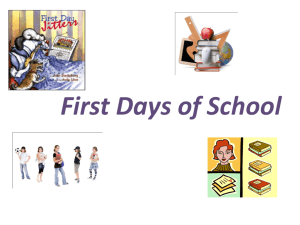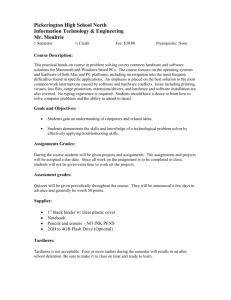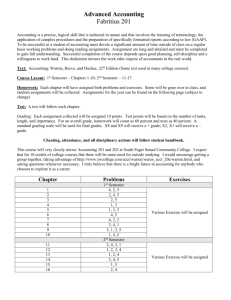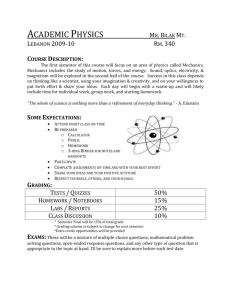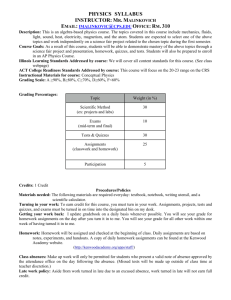First Days of School
advertisement
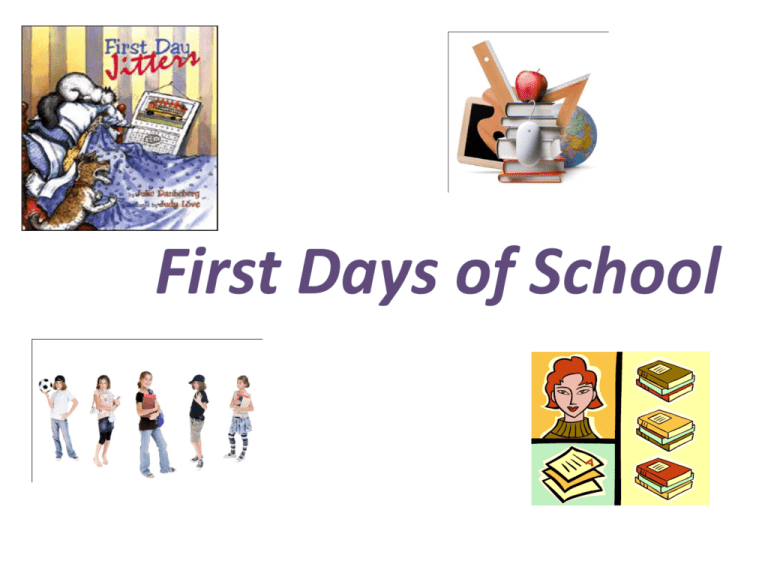
First Days of School The beginning teacher is expected to assume the same tasks and responsibilities as the most seasoned, veteran teacher on the school staff. •What are your thoughts and feelings as you read this quote? •Are you prepared to assume these responsibilities? Student achievement at the end of the year is directly related to the degree to which the teacher establishes good control of the classroom procedures in the very first week of the school year. --Harry Wong http://education.nmsu.edu/ci/morehead/documents/theeffectiveteacherwong-3.pdf “You don’t have to be great to start, but you do have to start to be great.” - Zig Ziglar So what do we need to do in the first days to ensure success? Know the story Know the characters Prepare the script Establish community KNOW THE STORY • Each school has its own history, its own story, its own community. KNOW THE CHARACTERS The adults in the school community are the individuals who keep the story alive. School Characters Principals Guidance Counselors Media Specialists Resource Staff Teachers New Teachers Secretaries Custodians OTHER important characters in your classroom community are PARENTS KNOW THE COMMUNITY School procedures you need to know . . . • How attendance is taken? • Are there specific discipline referral forms, where are they located, who gets them, what are the procedures for referrals? • How is money collected? Where are receipt books located? Where/to whom is money turned in? • What are the procedures for fire drills, tornado drills, etc. ? And you also need to know… • Where to get classroom supplies? • What are procedures for student check out, tardies, absences? • Who has substitute list? How are subs contacted? • What is the policy for work days, leave days, snow days? • What about extra-curricular duties? "The most important day of a person's education is the first day of school, not Graduation Day." – Harry Wong PREPARE THE SCRIPT “It is how you begin that is the most important.” -- Plato “There is no beginning too small.” -- Thoreau As you prepare the script, consider: •What creates the most anxiety among students on the first day of school? •What are their questions? According to Harry & Rosemary Wong (First Days of School), on the first day of school, students are ONLY interested in knowing the answers to these seven questions: 1. 2. 3. 4. Where am I supposed to sit? What will I be doing this year? How will I be graded? Am I in the right room? 5. What are the rules in this classroom? 6. Will the teacher treat me as a human being? 7. Who is the teacher as a person? Let’s Talk About It…. How are some ways you can address these questions and relieve anxiety of your students? 1. How will students know if they are in the right room? • Provide hall guides, signs, welcoming messages • Provide a sign on the door and whiteboard with teacher’s name, room number, schedule • Stand at the door, greeting students as they enter • Check students’ schedules and guide them to the right room 2. How will students know where they are supposed to sit? • Make a good impression by inviting students to take a seat much like a gracious host/hostess would invite you to sit or to dine. • Two types of seating arrangements: Open or Assigned • Assigned seating – – – – Alphabetical Playing cards Numerals Texts, information sheets, etc. with students’ names on bookmark – Template on overhead with students’ names on assigned seat Guidelines for arranging the classroom: • Be sure all students are easily seen by the teacher at all times • Be sure all students can easily see all instructional presentations and displays • Allow for ease of movement • Keep high traffic areas free of congestion • Make frequently used teaching materials/student supplies readily accessible • Seat students away from distracters Arrangement Options Theatre style Chairs lined up in rows facing the front of the room. This set-up is efficient with the participants are part of an “audience”. Chevron Style Traditional Classroom Style Most interactive of large group setups. Promotes a sense of participation. Allows Teacher/students to see each other and provides for easy movement & access. To establish security and consistency, a teacher must provide— • A well-organized, uncluttered, attractive room that provides students with access to learning and that prompts respect • A room that is ready and inviting for students • A location for schedules, rules, procedures, preview of what is to come • An area to display student work 3. How will students know the rules for your classroom? Students want to know the limits of each classroom! • Have clear, simple rules (3-5) • Establish procedures that will help your classroom run smoothly and review and practice these with students • Provide a copy of rules and procedures for students and parents Effective teachers manage classrooms with procedures. Ineffective teachers discipline students with threats and punishments. Procedures are expectations for student behavior (sharpening pencils, answering questions, entering/leaving classroom, make-up work, etc.). Spend the first 2 weeks teaching students how to be responsible for their behavior and their learning. Students want to succeed, and they want to be taught how to do things, but they need to be shown. 4. How will students know what they will be doing in your classroom this semester? • Provide a syllabus, policy sheet, an agenda that outlines the major focus of the class • Offer a pacing guide to students/parents • Begin the first day the way you will begin everyday in your classroom • Provide a calendar or space on the white board to post daily activities, assignments, homework , etc. 5. How will students know how they will be graded? • Work out your grading system so that it is appropriate to the amount of work you collect. • If you plan to weigh some assignments more than others, students need to understand that. • Post your grading plan; provide copies to students/parents. • Make sure your grading system is fair and consistent. 6. How will students know what kind of person you are? • Create a bulletin board or space where you display personal items, objects, pictures, etc. about yourself. • Bring in pictures of your family to display. • Share a bit of information about yourself with your students. Focus on your role as teacher, your expectations for yourself and students, and an important something your want your students to know about you. • Remember that you are the TEACHER, not a PEER. 7. How will students know how you will treat them while in your classroom? • Everyone wants to be treated with respect and dignity. • You have 7 seconds to create a positive first impression, beginning with… – How you greet them at the door – How you dress – What signs are posted in your classroom – How organized, prepared, & confident you appear to be – How you are in control of the learning environment As you are dressed, so shall you be perceived. And as you are perceived, so shall you be treated. You are a walking, talking advertisement! Give an elementary student 3 days, and the student will respect you. Give a high school student 10 days, and the student will respect you. -- Charles Galloway Top Dozen “To Do’s” Before School Starts 1. Plan for seating assignments. This prevents misbehaving because students believe, “S/he knows who I am.” 2. Determine essential procedures for a smoothrunning classroom 3. Plan! 4. Post rules 5. Identify a location to post daily agenda (“Today’s Targets”) 6. Create a daily routine for the first 5 min. of class (Bellringers) 7. Anticipate and prepare all supplies needed (dry erase markers, hall passes, stapler, tape, etc.) 8. Over PLAN! 9. Organize and prepare classroom so it’s ready for learning 10.Think of ways to learn students’ names quickly 11.Introduce yourself to the teachers next door and across the hall 12.Commit to connecting with each student daily through eye contact, greetings, quick notes, acknowledgements, high fives, etc.) Establishing Community “Schooling is first and foremost about relationships between and among students and teachers, and… community building …[which improves] teaching and learning.” Thomas Sergiovanni in Building Community in Schools Building classroom community is important because - we tend to be social creatures - we need to belong - we commit to mutual interests and shared ideals Create a positive CLASSROOM COMMUNITY by • Establishing routines and work habits in students first; worry about content later • Teaching organizational skills • Learning students’ names • Planning your first day down to the minute • Standing as you speak • Using a firm but soft voice • Beginning many sentences with “We will…” and “You will…” … and …. • Standing outside your door when students arrive. This establishes authority and suggests you consider them important enough to be waiting on them. • Setting high standards for yourself if you want a highly productive environment and if you expect students to meet high expectations of achievement! Student Information Full Name: ____________________________ Date of birth: _____________________ Parent/guardian’s names: _________________________________________________ Mailing Address: (street or PO Box) ________________________________________ Parent/guardian’s phone number: (home)_______________ (cell) ________________ Parent/guardian’s E-mail address: _______________Your E-mail address: _________ Your cell phone number: _______ Do you have access to the Internet at home? This Semester's Schedule 1. ___________________ Teacher ____________________________ 2. __________________ Teacher ____________________________ 3. __________________ Teacher _____________________ 4. ___________________ Teacher ____________________________ •Do you have any health issues I should know about? _____ If so, what are they? •List after school activities in which you participate (sports, band, work, etc.): • What are the top 5 songs you listen to ALL the time on your iPOD or Stereo? •What are your plans after high school? What are your career plans? •What is your favorite candy or dessert? Are you allergic to any food? ____ Please list food allergies: •What was your favorite class last year? Why? •Above And Beyond: On the back, please write a paragraph about yourself. Tell me anything else that you want me to know about you. Please do your very best work. BUILDING RELATIONSHIPS WITH PARENTS If you’d like your students to be successful, you will need to rearrange the letters in “parent,” add an “r” of relationship, and turn a parent into a PARTNER! Katy Ridnouer, author, Managing Your Classroom With Heart Build “bridges,” not walls between yourself and parents. “When elephants fight, it is the grass that gets trampled.” What any parent really wants in a child’s teacher • • • • • • • • Enthusiasm, energy, a positive attitude Competence, confidence Personality, openness, respect, welcoming Well-planned, multi-dimensional Honesty Understanding of total school experience High expectations Reasonable, worthy assignments tied to curriculum • Substantive feedback on assignments and tasks Why do some parents resist involvement? Brainstorm for 2 minutes with a partner about possible reasons. Be ready to share with the group. PARENTS often feel…. Look to Parents to… • Show support for learning at home; • Communicate positive feedback about a teacher's influence or performance; • Welcome new teachers; • Support fair discipline measures that teachers impose; • Talk to a teacher directly about a problem; and • Become active partners in education. Communicating with Parents and Families More and more, educators are using websites and social media platforms to communicate with parents. If you’re genuinely interested in what a father or mother feels or wants, ask. In a Million Words or Less… (Homework for Parents) Dear Parent/Guardian IN A MILLION WORDS OR LESS . . . TELL ME ABOUT YOUR SCHOLAR! Yes, you are getting a homework assignment! It takes me a great deal of time to know your child. Some I never really know. This activity gives you a chance to tell me what you think I should know about your scholar. I will read every one of them. I will not share your comments with any other person, including other teachers, unless you tell me in your message that I can. Your scholar is in for a great experience this semester. The curriculum is rigorous, but very doable. I teach from a thematic approach and expect my students to read, write, think, work in groups, work independently, and be creative. Most importantly, I want students to make connections between what we read and study and real life -- especially their lives. This should be a very exciting and busy semester. Take your time with this, but there must be a deadline. Please send In a Million Words or Less . . . to me no later than ____. You can either send it with your scholar or email it to me. You can find my email address below. Communication is important! Please feel free to call on me, email me, or visit any time you have questions or concerns. I appreciate your time and effort. Sincerely, COMMUNICATING WITH PARENTS • Contact every parent at the beginning of the school year/semester • Be proactive • Reach out immediately if a conflict occurs • Return calls promptly • Use caution in responding to negative e-mails • Admit to your mistakes • Notify your administrator immediately of tense situations • Refuse to be intimidated or accept verbal abuse Positive parent communication is vital to help students succeed, enhance our professional reputations, and save us a great deal of stress. You will be talked about among parents at the ball field, the church, the grocery store, and even on Facebook. By taking steps to be a positive communicator, you'll greatly increase the likelihood that your students' parents are involved in their learning—and that the "word on the street" is nothing but good. Maintaining contact with parents is CRITICAL!!! Set up as many positive interactions as possible!! HAPPY GRAMS (minimum of 1 each grading period ) I just wanted you to know ….. Find at least ONE positive comment to make about every student each grading period. Use mailing labels to keep track of notes sent. POSITIVE MESSAGE TO PARENTS Dear ______________ I am writing to let you know how pleased I am with _____ recent success in my class. You will be happy to know that ___________________ ______________________________________ ______________________________________ I know you are as proud of this effort and achievement as I am. Thank you for your support. Sincerely, OTHER POSITIVE INTERACTIONS: • Have parents sign papers with GOOD GRADES as well as ones with not so good grades. • Compliment parents to other people. Don’t hesitate to let students know that you think highly of their parents. • Make it a habit to thank parents for their support whenever you see them. • Use school voice mail to record a positive message to parents. • Send home a thank you note after a conference. When you have concerns, let parents know! Dear Parent or Guardian of _______________________, The purpose of this communication is to inform you that I am presently experiencing some problems with _______. I would greatly appreciate your cooperation in working with me in trying to take corrective measures to eliminate these problems. The attitudes and habits listed below are important elements that have a significant affect on the success of a classroom. I have checked the areas that are making it difficult for your child to be successful and reach his/her potential in my class: AREAS OF CONCERN ___Excessive talking _____ Disturbing others _____ Lack of effort _____ Inattention _____ Disrespectful of others _____ Bad attitude _____ Excessive tardies _____ Excessive absences _____ Low grades _____ Not prepared for class ___ Does not complete work on time _____ Incomplete assignments ___ Missing assignments _____ Excessive detentions __ Sleeps in class …continued At this time ________________ ‘s average in this class is _______. If you have any questions, please contact me at school. My planning period is _____. If you would like a personal conference, please contact the counseling office for arrangements at XXX-XXXX. I appreciate your help in seeing that ___________ is successful in _______________. Sincerely, Parent Conference Are you prepared? Conferences can be stressful for EVERYONE! Document, Document, DOCUMENT! • Keep accurate documentation of all academic and behavioral problems Use notebook with one page designated for each student, or a 3x5 index card, or back of information sheet • Provide specific, factual, observable data • Keep folder with student work, copies of correspondence, notes of phone conversations The All-Important Conference • Focus on the positives, as well as the areas that need improvement. • Your goal is to forge an alliance with the parents. Behaving with sincerity, displaying knowledge of the individual student, and having a plan of action in mind will go a long way in getting the parent on your team. • Consider asking your mentor, counselor, or a member of the administrative staff to be in attendance. However, parents need to be informed if additional school personnel will be present. • Practice the very best of manners, treating each parent with full respect and dignity, whatever their occupation or socio-economic status. • Address parents by their last names preceded by the appropriate Mr., Mrs., or Ms. until you are invited by them to use their first name. • Balance the “air time.” While you have many important points to make, it is crucial that the parents have adequate time to speak about issues of their own concern and to ask questions. • Keep your cool. Remember that the student and his/her needs come first. • Remember to ask for parent suggestions (for the best times and ways to provide feedback, “insider” tips on the student, strategies the parent has discovered that work best, etc.). • NEVER, EVER meet alone with parents. Schedule conferences in public places such as the Counseling or Media Center, or main office. Whether or not some other school official is actually seated with you during the meeting, make sure other school personnel are nearby. After the conference: • Follow through on your agreements. • Go back through your notes and reflect on your next course of action. • Document the time, place, participants, and conversation of the conference for future reference. Be sure to state what you have done to correct the problem. Your nonverbal language is crucial for success; be friendly and attentive. Don’t put parents on the defensive by becoming angry or accusatory. Don’t try to outtalk parents; don’t give into the inclination to interrupt. IMPORTANT POINTS TO REMEMBER Keep your cool. The student and his/her needs come first. Ask for parent suggestions (for the best times and ways to provide feedback, “insider” tips on the student, strategies the parent has discovered that work best, etc.). “Coming together is a beginning. Keeping together is progress. Working together is success.” Henry Ford A Teacher’s Influence “I've come to the frightening conclusion that I am the decisive element in the classroom. It's my daily mood that makes the weather. As a teacher, I possess a tremendous power to make a child's life miserable or joyous. I can be a tool of torture or an instrument of inspiration. I can humiliate or humor, hurt or heal. In all situations, it is my response that decides whether a crisis will be escalated or de-escalated and a child humanized or dehumanized.” -- Dr. Haim Ginott Teacher and Child (1976) “ “Too often we underestimate the power of a touch, a smile, a kind word, a listening ear, an honest compliment, or the smallest act of caring, all of which have the potential to turn a life around.” Credit for many ideas in this presentation given to: Harry K. and Rosemary Wong. How To Be An Effective Teacher The First Days of School Mountain View CA: Harry K. Wong Publications, Inc. 1998. Resources to Access Immediately! • Teacher Vision – New Teacher Resources: http://www.teachervision.fen.com/newteacher/teachingmethods/44377.html?WT.mc_id=GS_2012-0716_email • Resources for Secondary Teachers: http://dawnrules.tripod.com/ Continued… • About.com – Secondary School Education http://712educators.about.com/ • Teachers.net http://teachers.net • Discovery Education – Free 9-12 Teacher Resources http://www.discoveryeducation.com/teachers /free-9-12-teacherresources/index.cfm?campaign=flyout_teache rs_912 • PBS Teachers – Free Resources http://www.pbs.org/teachers/ • Links to Educational Resources on the web http://www.pacificnet.net/~mandel/Educatio nalResources.html • Teachers Helping Teachers http://www.pacificnet.net/~mandel/
